What to Feed a Hamster – a Beginner’s Guide to Hamster Food

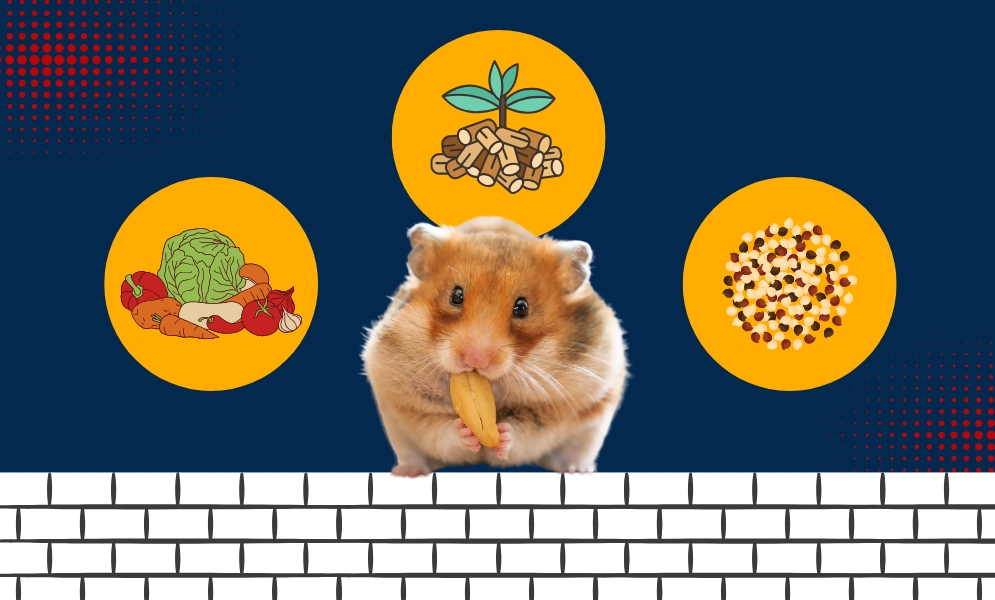
As a hamster owner, ensuring your furry friend receives the proper nutrition is crucial for their overall well-being. These small, energetic creatures have specific dietary requirements that must be met to maintain optimal health.
Understanding what to feed a hamster and how to provide a balanced diet is the key to keeping your pet happy and thriving.
In this comprehensive guide, we’ll explore the world of hamster nutrition, covering everything from commercial food options to homemade recipes and supplementary foods. We’ll also discuss the importance of portion control, feeding schedules, and tips for encouraging healthy eating habits.
So, let’s dive in and discover the best ways to nourish your beloved hamster!
What to Feed a Hamster?
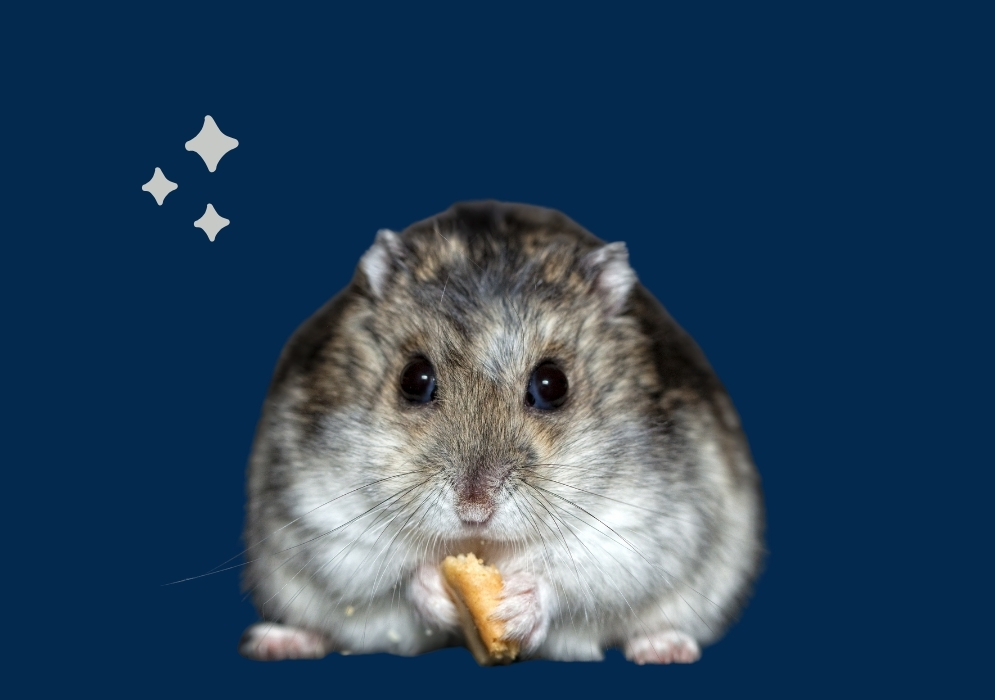
Before diving into details about Hamster food, let’s look at a hamster’s feeding habits. Hamsters are omnivores, which means they eat both plant-based and animal-based foods.
If you are a first-time owner of a hamster, you need to have a very good understanding of their food habits and requirements. It is crucial for several reasons, such as:
- Your hamster stays healthy and lives for a longer period
- Knowing which food is good for your hamster and what to avoid will prevent you from accidentally poisoning your hamster.
- Giving certain types of food to your hamster will satisfy their natural foraging instincts and stimulate them mentally.
In the wild, their diet consists of seeds, grains, fruits, vegetables, and the occasional insect. To replicate this balanced diet at home, you must provide a mix of commercial hamster food, fresh produce, and occasional protein sources. Let’s explore these options in detail.
Commercial Hamster Food Options
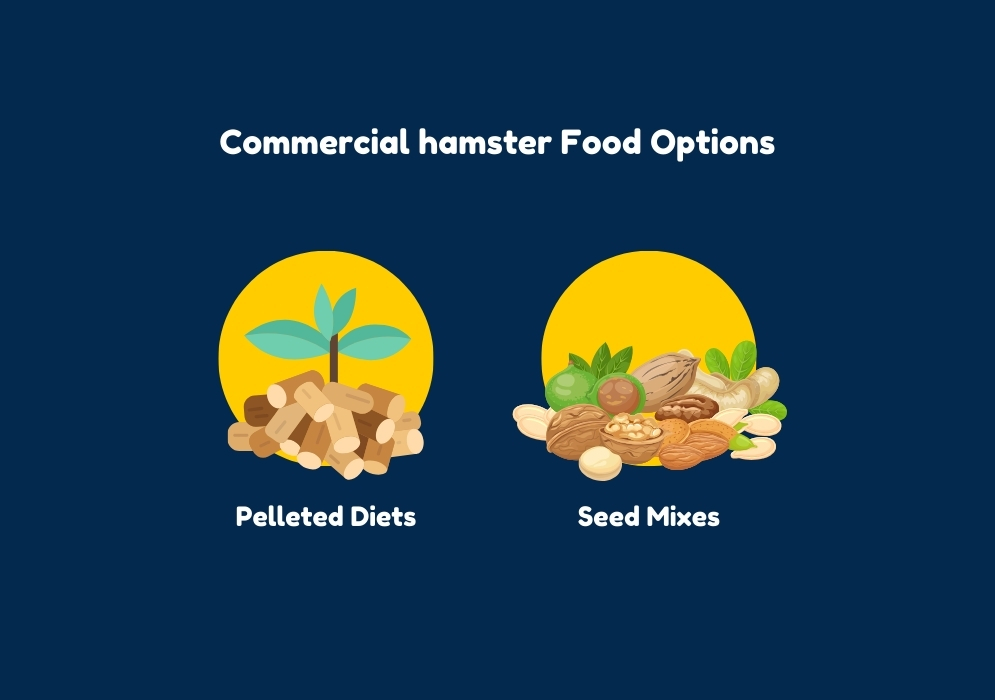
Commercial hamster food is a convenient option for many pet owners. These pre-formulated mixes typically contain a combination of seeds, grains, and pellets, providing a balanced source of nutrients.
However, it’s important to read the labels carefully and choose a high-quality brand that meets your hamster’s dietary requirements.
Here are some popular commercial hamster food options:
Pelleted Diets
Pelleted foods are a great option because they offer a balanced diet in every bite. These pellets prevent selective eating, where hamsters pick out their favorite bits and leave the rest. Pelleted diets usually look like small biscuits or cereal pieces and should form the base of your hamster’s diet.
Seed Mixes
While hamsters love seed mixes, they can be picky and may only eat their favorite seeds, leading to an unbalanced diet. To avoid this, you can mix pellets with seeds or choose a seed blend that includes pellets. Look for mixes that contain grains, seeds, and dried fruits or vegetables.
When selecting commercial hamster food, look for brands that use high-quality ingredients and are free from artificial preservatives, colors, and flavors.
Homemade Hamster Food Recipes
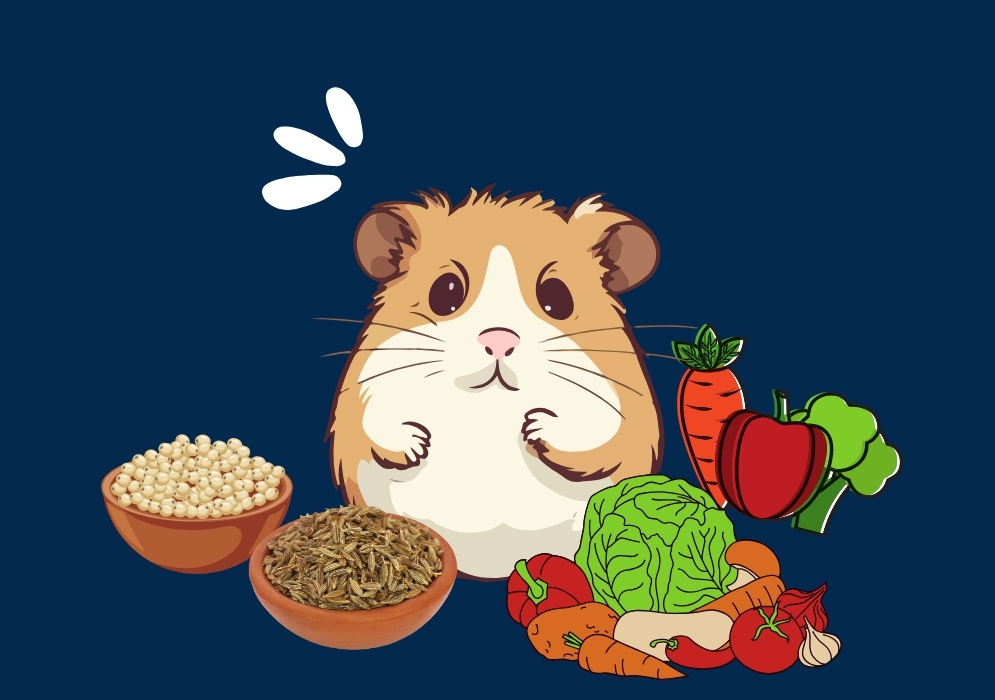
For those who prefer a more hands-on approach, homemade hamster food recipes offer a nutritious and customizable option. By preparing your hamster’s food at home, you can control the ingredients and tailor the recipe to meet their specific needs.
Here are a few delicious and nutritious homemade hamster food recipes to try:
Whole grain mix
- Ingredients: Rolled oats, millet, quinoa, and flaxseeds
- Instructions: Mix all ingredients together and store in an airtight container.
Veggie delight
- Ingredients: Chopped carrots, broccoli, spinach, and a sprinkle of hamster-safe seeds
- Instructions: Combine all ingredients and serve fresh or lightly steamed.
Protein-packed treat
- Ingredients: Cooked chicken or turkey, boiled egg, and a sprinkle of cheese. You can also add mealworm, available at pet stores to this dish
- Instructions: Shred or chop the protein sources and mix them together.
When preparing homemade hamster food, ensure all ingredients are fresh, high-quality, and free from potential contaminants.
Supplementary Foods for Hamsters
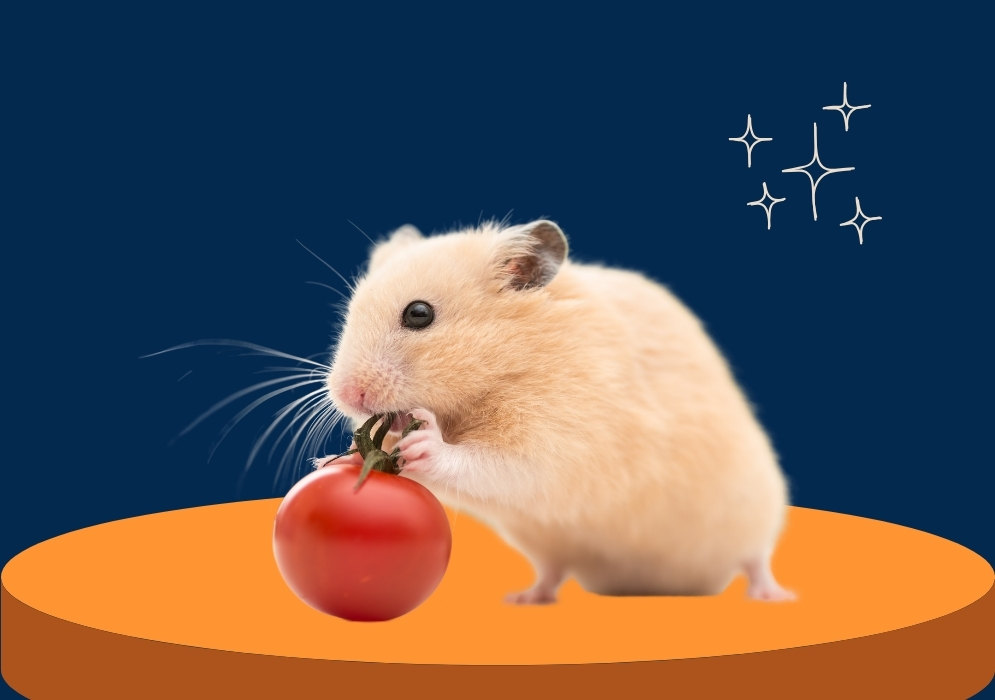
In addition to their main diet, hamsters can benefit from supplementary foods that provide additional nutrients and variety. These foods should be offered in moderation and as occasional treats or supplements to their regular diet.
Here are some healthy supplementary foods for hamsters:
- Fresh vegetables (e.g., carrots, broccoli, spinach)
- Fresh fruits (e.g., apples, berries, melon)
- Whole grains (e.g., whole wheat bread, brown rice)
- Lean proteins (e.g., cooked chicken, hard-boiled eggs)
- Unsalted nuts and seeds (e.g., sunflower seeds, almonds)
Remember to introduce new foods gradually and monitor your hamster’s reaction to avoid any potential digestive issues.
Foods to Avoid Feeding Your Hamster
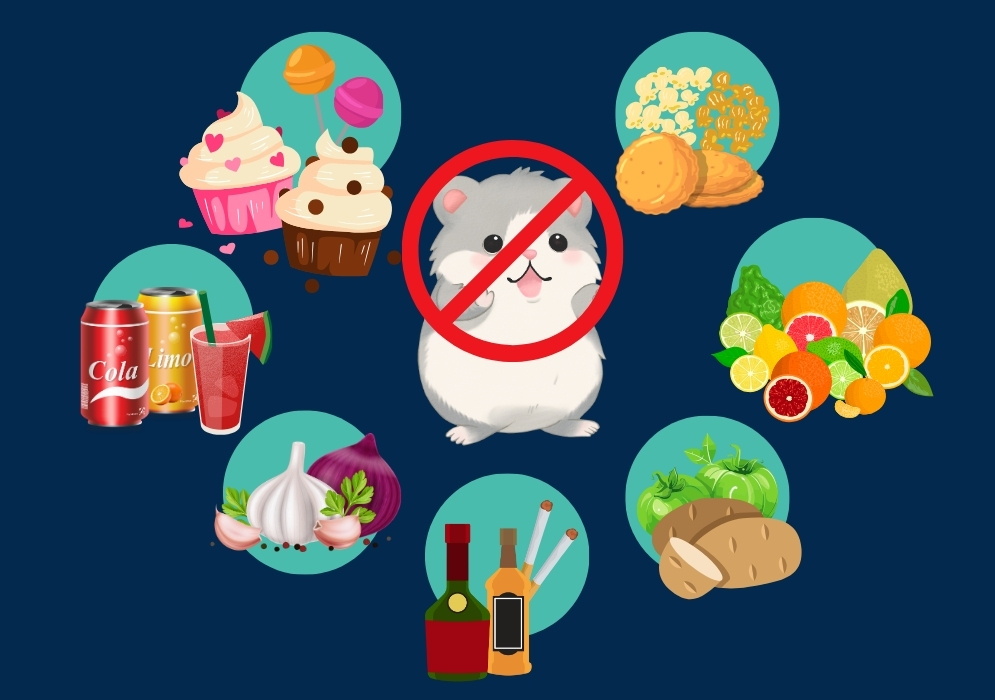
While there are many healthy options for feeding your hamster, certain foods should be avoided altogether. These foods can harm your pet’s health and cause digestive problems, obesity, or other complications.
Here are some foods to steer clear of when feeding your hamster:
- Sugary treats (e.g., candy, chocolate, cookies)
- Salty snacks (e.g., chips, pretzels, salted nuts)
- Caffeinated beverages (e.g., coffee, tea, soda)
- Citrus fruits (e.g., oranges, lemons, grapefruits)
- Onions and garlic
- Raw potatoes and green tomatoes
- Alcohol and tobacco products
It’s essential to be vigilant about what you feed your hamster and always consult with a veterinarian if you’re unsure about the suitability of a particular food item.
Feeding Schedule and Portion Control for Hamsters
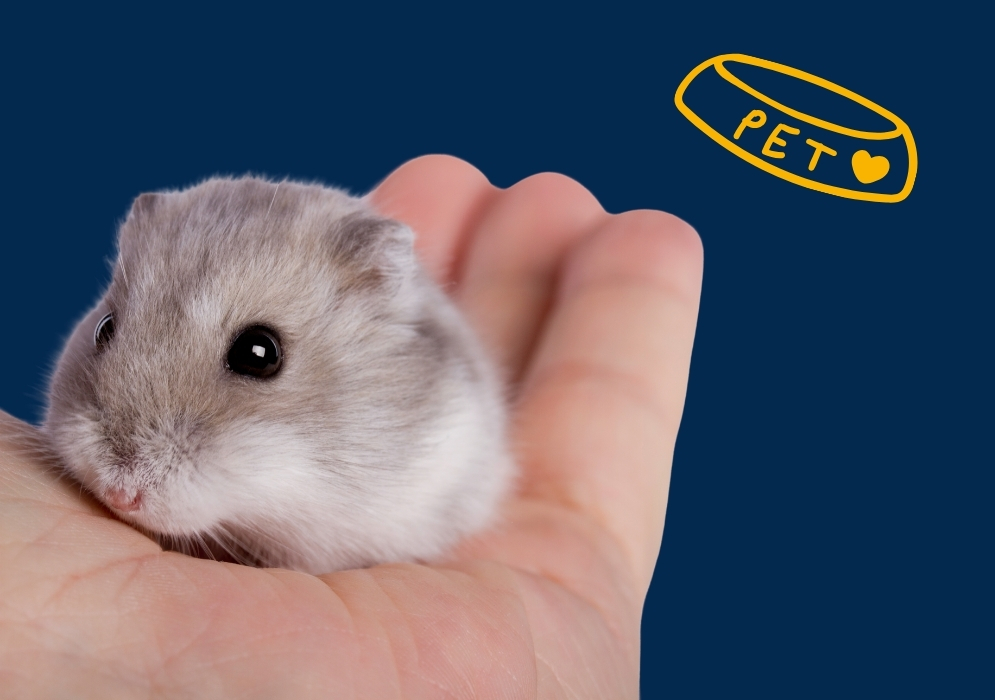
Establishing a consistent feeding schedule and practicing portion control are crucial to maintaining your hamster’s health and preventing obesity. Overeating can lead to various health issues, including digestive problems, diabetes, and shortened lifespan.
Here are some tips for establishing a healthy feeding schedule and practicing portion control:
Feeding Schedule
Hamsters tend to hoard food, so it’s essential to provide them with a consistent feeding schedule. Aim to feed your hamster once or twice a day, preferably at the exact times each day. This will help regulate their eating habits and prevent overeating.
Portion Control
Hamsters have small stomachs, so it’s important to offer appropriate portion sizes. A general guideline is to provide about 1-2 tablespoons of food per day for an average-sized hamster. Adjust the portion size based on your hamster’s age, activity level, and specific dietary requirements.
Food Storage
Store your hamster’s food in an airtight container to maintain freshness and prevent spoilage. Discard any uneaten fresh foods after 24 hours to avoid the risk of contamination.
Monitor Food Intake
Keep an eye on your hamster’s food intake and adjust portions accordingly. If you notice your hamster is not eating a lot of food every day, reduce the portion size. Conversely, if your hamster seems to be finishing their food quickly, you may need to increase the portion size slightly.
By following a consistent feeding schedule and practicing portion control, you can help your hamster maintain a healthy weight and prevent potential health issues associated with overeating or malnutrition.
Tips for Encouraging Healthy Eating Habits in Hamsters
Encouraging healthy eating habits in your hamster can be challenging, but with patience and creativity, you can help your furry friend develop a positive relationship with food. Here are some tips to consider:
Variety is Key
Offer a variety of foods to prevent boredom and ensure your hamster receives a well-rounded diet. Rotate different types of commercial food, homemade recipes, and supplementary foods to keep mealtime interesting.
Make It Interactive
Hamsters are natural foragers, so consider incorporating interactive feeding methods. Scatter their food around their enclosure or use puzzle feeders to encourage natural foraging behavior and mental stimulation.
Positive Reinforcement
Reward your hamster with a small, healthy treat when they exhibit positive eating behaviors. This positive reinforcement can help reinforce healthy habits and create a positive association with mealtime.
Gradual Transitions
If you’re introducing new foods or transitioning to a different diet, do so gradually. Sudden dietary changes can cause digestive upset and stress for your hamster. Start by mixing small amounts of the new food with their current diet and gradually increase the ratio over time.
Monitor Water Intake
Ensure your hamster has access to fresh, clean water at all times. Proper hydration is essential for digestion and overall health. Consider offering water bottles or shallow water dishes to encourage drinking.
By implementing these tips, you can create a positive and enriching mealtime experience for your hamster, promoting healthy eating habits and overall well-being.
Providing the Best Nutrition for Your Hamster
Providing the best nutrition for your hamster is a vital responsibility as a pet owner. By understanding the importance of a balanced diet, exploring various food options, and implementing proper feeding practices, you can ensure your furry friend receives the nourishment they need to thrive.
Remember, every hamster is unique, and their dietary requirements may vary based on age, activity level, and overall health. It’s always best to consult a veterinarian or animal nutritionist to develop a personalized feeding plan that meets your hamster’s needs.






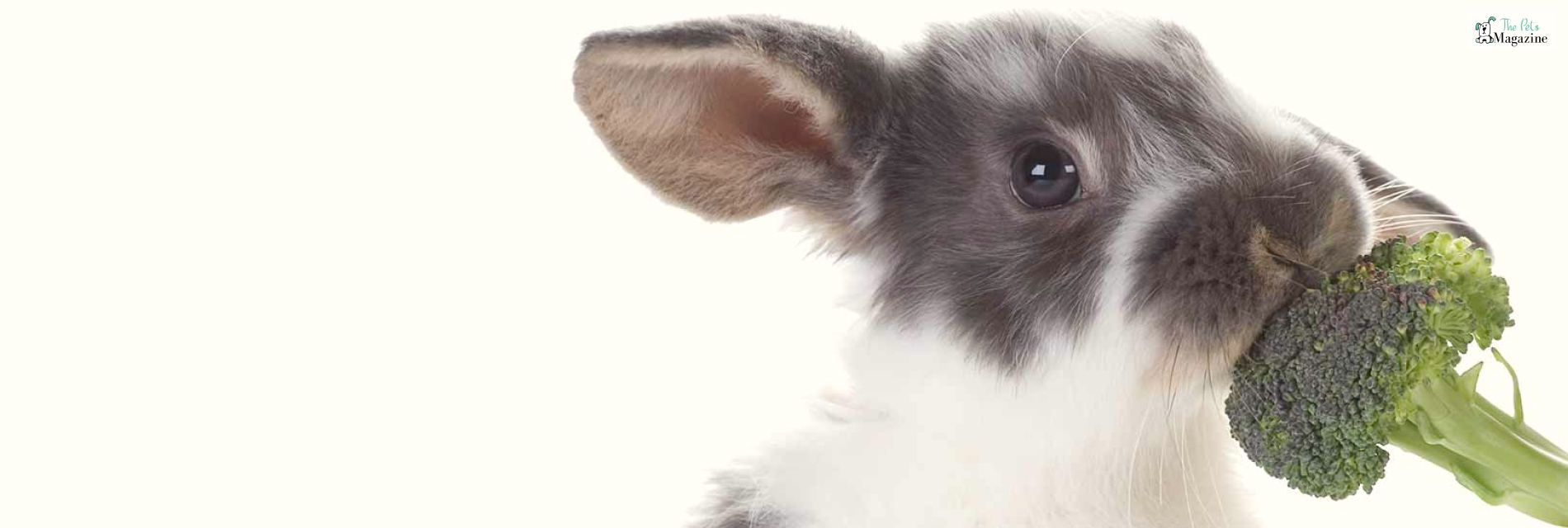
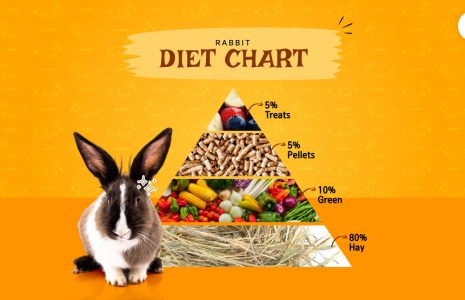

Leave A Comment